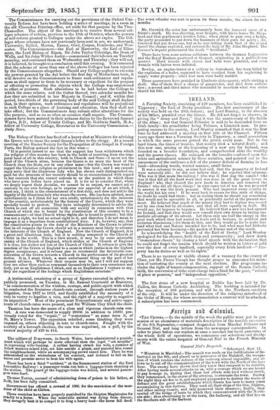IRELAND.
A Farming Society, consisting of 120 members, has been established in Tipperary ; the Earl of Derby president. The first auniversary of the society was held on the 20th instant ; and Lord Stanley, in the absence of his father, presided over the dinner. He did not forget to observe, in giving the "Army and Navy," that it was the anniversary of the battle of the Alma ; nor that General P6lissier is said to be descended from an Irish family—his grandfather being Palisser, a Limerick man. In pro- posing success to the society, Lord Stanley remarked that it was the first time he had addressed a meeting on that side of the Channel. Fifteen years ago there was a Farming Society in Tipperary, a small association in which the same persons gained the prizes every year. But in the hard times, the times of trouble, that society died a natural death ; and this new one, arising at the beginning of a new men for Ireland, was founded on a broader foundation, and comprehended alike the wealthy and the poorer classes. Ile enlarged on the benefits conferred upon dis- tricts and agricultural science by these societies, and pointed out to the amusement of the audience a few of the grosser defects of farming in Ire- land—abounding weeds, wasted manure, small farms.
It was a calumny to say, as some had said, that the peasantry of Ireland were naturally idle: he did not believe that; he repelled that calumny. Who was it that made the railway ? who was it that dug the canals ? who was it that did all the hard work that was done in all the great towns in England ? who that cleared the new lands in America and removed the forests ? who did all these things ? in nine cases out of ten he was prepared to answer it was the Irish peasant. Who had improved every country in the world but his Own? If he went back to causes for this state of things, no doubt he could find them ; but in stating them he should say something that would not be agreeable to all, or practically useful at the present mo- ment. He believed that much of the misery they had to deplore was caused not by one class but by all classes, and that all were equally in fault. He would say, let bygones be bygones. He believed that a new rera had opened for Ireland, and that they would now consult their own duties by taking im- mediate advantage of its advent. Let them only use half the energy in the good work which they had wasted in feuds and in factions, in political and sectarian dissensions,—let them do this, and they would go far to make Ire- land what God and Nature intended her to be, and what man had hitherto prevented her from becoming—the garden of Europe and of the world. In acknowledging the "health of the Earl of Derby," Lord Stanley apologized for his absence, both then and permanently; and drew down "tremendous cheers" by closing a brief speech with the declaration that he could not forget the maxim which should be written in letters of gold over the door of every landlord, especially every Irish landlord—" Pro- perty has its duties as well as its rights."
There is no vacancy or visible chance of a vacancy for the county of Clare yet Mr. Pierce Creagh has thought proper to announce his inten- tion of contesting the county at the next election. His programme in- cludes the right of tenant-compensation, support of the Roman Catholic faith, the conversion of tithe rent-charge into a fund for the poor, "refusal of place or pension," and "independent opposition."
The first stone of a new hospital at Dublin has been laid by Dr. Cullen, the Roman Catholic Archbishop. The building is intended for the reception of 500 patients, and will be in the Northern outskirts of the city. It will be under the direction of the religious sisterhood of the Order of Merry, for whose accommodation a convent will be attadhed. A subscription has been commenced.


































 Previous page
Previous page